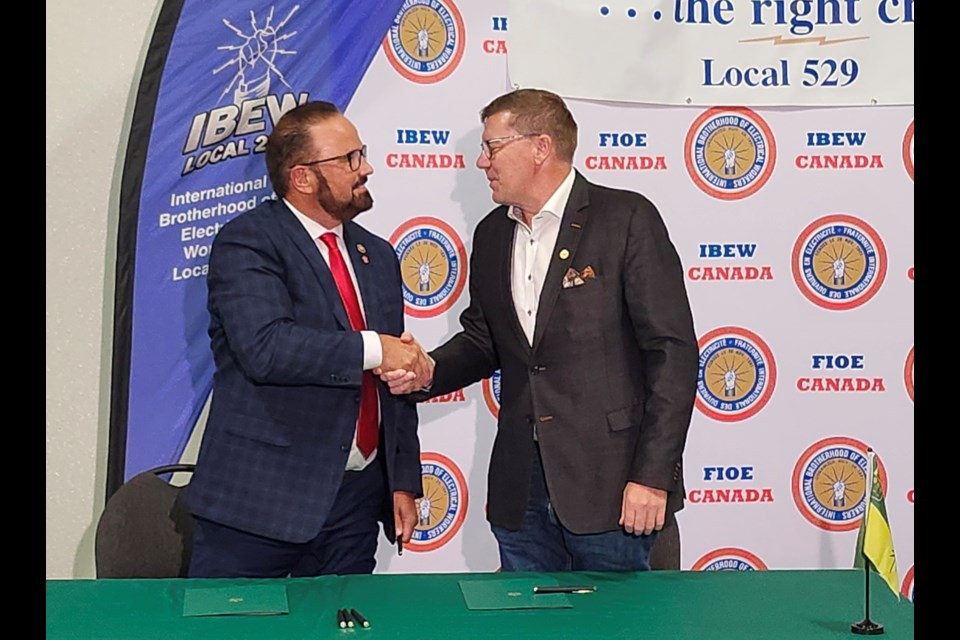SASKATOON — Providing Saskatchewan electrical workers with the chance to train for future opportunities in nuclear power generation could prove to be a massive deal for the province if, as Premier Scott Moe says, nuclear power may become the only option.
On Thursday, Sept. 19, the Government of Saskatchewan and the International Brotherhood of Electrical Workers signed a letter of intent at the IBEW office in Saskatoon to expand apprenticeship training for electricians and those who want to enter the trade.
Premier Scott Moe and Minister for Immigration and Career Training Jeremy Harrison represented the provincial government, with Russ Shewchuck, Tyler Holmen, Aaron Laughlin, and Murray Palmer representing IBEW.
Shewchuck is IBEW First District International Vice President, Holmen is the business manager and financial secretary for Local 267, Laughlin is the treasurer for Local 2038, and Palmer is the business manager/financial secretary for Local 529.
The LOI will allow the IBEW’s local unions in Saskatchewan to sign into a memorandum of understanding (MOU) with the Ministry of Immigration of Career Training to begin offering construction electrician and power line technician apprenticeship training in 2025. Training will be offered to IBEW members and non-members and be responsive to the training needs of workers. The MOU will also provide support for the offering of training for future opportunities in nuclear power generation.
Last year, the provincial government granted $80 million to the Saskatchewan Research Council to pursue a microreactor project in Saskatchewan. The project aims to understand better technology and its future in the province’s energy sector.
The province is considering using nuclear power as another source of energy supply to meet growing demand.
Moe said SRC is advancing the microreactor technology in partnership with Saskatchewan-owned Westinghouse. The province is considering having large-scale reactors in the future to satisfy its electricity demands.
“We will have increased industrial, commercial, and residential investment. And all of that, I think, comes together and depends on agreements like this so that we have qualified folks at IBEW and others to satisfy our needs. It [partnership] is not only huge, it's necessary. As we find our way to the end of the lifespan, for example, of some of our electrical generation facilities, we need to build something new. We haven't many options as we look to satisfy some of the requirements,” said Moe.
He added having IBEW as a partner to train the future labour force that will work in the energy sector would ensure that they have the skills to do their job as cleaner energy sources become an alternative in the coming years.
“We're going to run out of the life cycle of the assets that we have because that's the most economical thing to do, and we have people that are operating them that are highly trained, but we want to work specifically to today's conversation with organizations like IBEW on ensuring that we are training, and transitioning those folks for whatever is next. And in this province, it looks like it's nuclear power. There aren't many other options for us,” said Moe.
“We're maxed out on our hydropower. Battery technology isn't quite there yet, but we have to generate that power in the first place anyway. And we're well down the way regarding the small modular reactor conversation. The opportunity is enormous, but we must look at all the opportunities to create and build what the world wants to design and develop here. We must create and build that opportunity for a brighter future for the Saskatchewan people. That's our goal.”




